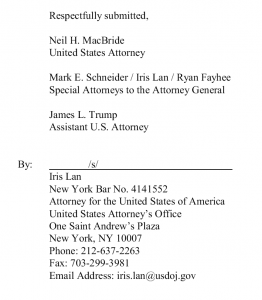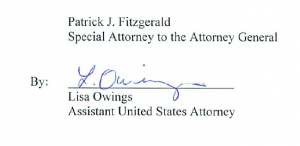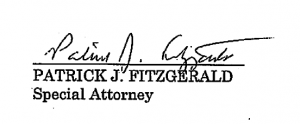Selective Prosecution from CIA’s US Attorney
In its response to John Kiriakou’s claim he is being selectively prosecuted, the government cites this passage from US v. Armstrong.
A selective prosecution claim asks a court to exercise judicial power over a special province of the Executive. The Attorney General and United States Attorneys retain broad discretion to enforce the Nation’s criminal laws . . . . As a result, [t]he presumption of regularity supports their prosecutorial decisions and, in the absence of clear evidence to the contrary, courts presume that they have properly discharged their official duties. In the ordinary case, so long as the prosecutor has probable cause to believe that the accused committed an offense defined by statute, the decision whether or not to prosecute, and what charge to file or bring before a grand jury, generally rests entirely in his discretion. [my emphasis]
It then describes the standard for presumption of regularity by citing David Passaro’s unsuccessful appeal.
Kiriakou seeks to overturn the presumption of regularity by asserting that the decision to charge him must have arisen from some illegitimate prosecutorial motive, rather than the investigation having followed the facts where they led. However, the defendant fails to offer clear evidence to support his claim, and falls far short of satisfying the high burden required to overcome the presumption of regularity. See United States v. Passero, 577 F.3d 207, 219 (4th Cir. 2009) (“[u]nless a defendant provides ‘clear evidence’ to overcome the presumption that a government prosecutor has acted lawfully and without discrimination-a ‘particularly demanding’ standard-he cannot demonstrate a constitutional violation for selective prosecution.” (citation omitted)). [original spelling error for “Passaro” highlighted]
The entire filing is signed this way:
Compare that signature with this one, from before Kiriakou was indicted.
Or this signature, from the indictment itself.
Monday’s response to Kiriakou’s selective prosecution motion is the first submitted after Patrick Fitzgerald’s last day on Friday. If I’m not mistaken, it is the first filing submitted after the guy selected for his independence from the CIA’s witch hunt on torture departed government. It is, AFAIK, the first public hint at what the new investigative reporting structure and team looks like (which appears to have completely changed, even beyond Fitzgerald’s departure).
And the filing shows that, rather have the prosecution led by a US Attorney assigned as a Special Attorney reporting directly to the Attorney General, the prosecution now includes Neil MacBride, US Attorney for Eastern District of VA. And while the designation of AUSAs Schneider, Lan, and Fayhee as Special Attorneys suggests some kind of special reporting structure (Lan, at least, is in SDNY, not EDVA), the filing shows that the CIA’s US Attorney, the US Attorney’s office for EDVA, now has a role in the prosecution.
Which brings me to the problem with the government’s citations on selective prosecution.



